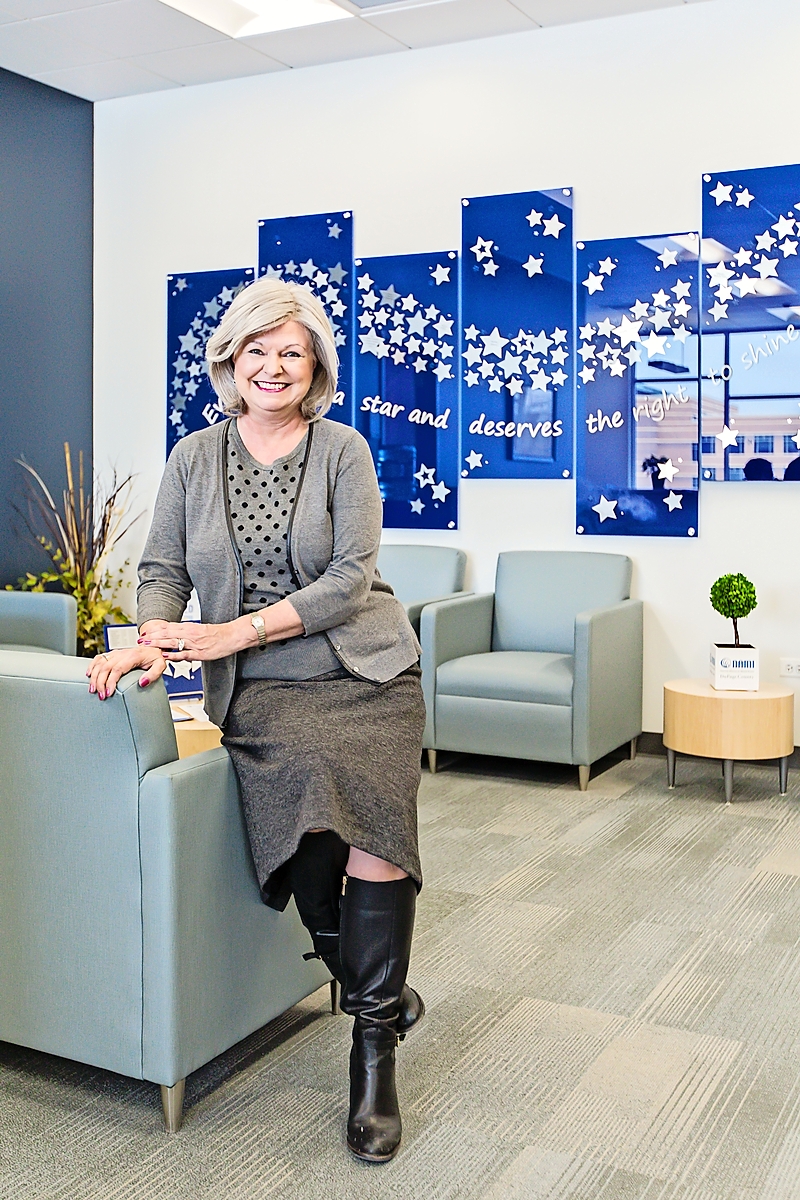Picture of Health
By Hilary Decent
February 2018 View more Humanitarian

For Angela Adkins, the defining moment came on an ordinary Monday evening, no different than any other. She was leaving her office at 7:00 p.m. when she glanced back at the building with its lights aglow. In one window she saw a family support group deep in conversation; in another, five men were working out. Through a third window an educational course was being held, and in yet another women were enjoying yoga.
“Looking back, I could see all these people being helped,” she says. “You can build a building but it doesn’t mean that people will come. I feel so proud to be part of an organization that can do that.”
DuPage Division
For nearly ten years Adkins has been the executive director of NAMI DuPage, the local arm of the National Alliance on Mental Illness, which helps those with mental illness and their families. Two years ago it moved to a larger building close to the government offices in Wheaton, rented from the county. With more space, NAMI is able to offer work experience and recreation to help clients get back on their feet.
NAMI DuPage began with a staff of six working with 8,000 clients. Today, the staff of 20 reaches a growing number of people—35,000 per year—because of the increasing awareness of mental health.
“I have been very privileged to work with people with real vision and dreams,” Adkins says. “If we can help one family, one individual, its all worthwhile. Mental illness is a disease and it’s not treated with the respect it should be.”
Personal Effects
Adkins, who moved to the U.S. from England 28 years ago, knows what it’s like to live with mental illness. Her adopted parents suffered from bipolar disorder, and her older sister suffered from Huntington’s disease, a degenerative brain disorder, which led to her death at just 32.
“You can’t prevent mental illness, but you can make the journey better with education and recognizing signs and symptoms,” Adkins says. “It’s like many illnesses. As a patient, you can help by making sure that behaviors remain acceptable by doing everything you can—by taking meds, sleeping properly and sticking to an appropriate diet. We can educate those families who are mystified as to why someone in their family is behaving the way they are, and we have courses to help them to deescalate situations.”
Adkins didn’t imagine her future would be working in mental health. A four-week class at the famed British modeling school Lucie Clayton in London turned into opportunities to model in New York and Canada.
“I was just 17 when I started, but after a while I realized no one was talking to me—they talked over me and just didn’t expect me to answer,” she says.
At 19 she held a fashion show to raise money for Huntington’s, and the impact of her work was immediately evident.
“I woke up on a Saturday morning with no money, but by the evening had raised enough for a minivan,” she says.
These days Adkins is still raising money to help others. NAMI is a nonprofit that relies on grants and donations to survive.
“I’m employed by a board of volunteers who give their time, treasures and talents to the cause,” Adkins says. “We do it so that we can change lives and save lives.”
For more information on NAMI support programs, visit namidupage.org.


